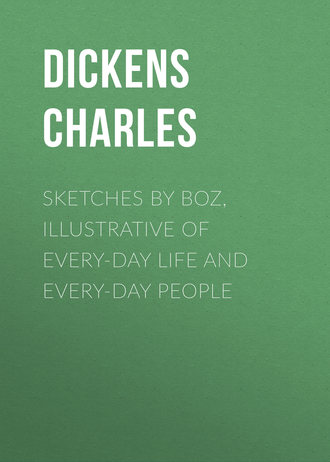
Чарльз Диккенс
Sketches by Boz, Illustrative of Every-Day Life and Every-Day People
‘Mr. Parsons?’ said the man, looking at the superscription of a note he held in his hand, and addressing Gabriel with an inquiring air.
‘My name is Parsons,’ responded the sugar-baker.
‘I’ve brought this here note,’ replied the individual in the painted tops, in a hoarse whisper: ‘I’ve brought this here note from a gen’lm’n as come to our house this mornin’.’
‘I expected the gentleman at my house,’ said Parsons, as he broke the seal, which bore the impression of her Majesty’s profile as it is seen on a sixpence.
‘I’ve no doubt the gen’lm’n would ha’ been here, replied the stranger, ‘if he hadn’t happened to call at our house first; but we never trusts no gen’lm’n furder nor we can see him – no mistake about that there’ – added the unknown, with a facetious grin; ‘beg your pardon, sir, no offence meant, only – once in, and I wish you may – catch the idea, sir?’
Mr. Gabriel Parsons was not remarkable for catching anything suddenly, but a cold. He therefore only bestowed a glance of profound astonishment on his mysterious companion, and proceeded to unfold the note of which he had been the bearer. Once opened and the idea was caught with very little difficulty. Mr. Watkins Tottle had been suddenly arrested for 33l. 10s. 4d., and dated his communication from a lock-up house in the vicinity of Chancery-lane.
‘Unfortunate affair this!’ said Parsons, refolding the note.
‘Oh! nothin’ ven you’re used to it,’ coolly observed the man in the Petersham.
‘Tom!’ exclaimed Parsons, after a few minutes’ consideration, ‘just put the horse in, will you? – Tell the gentleman that I shall be there almost as soon as you are,’ he continued, addressing the sheriff-officer’s Mercury.
‘Werry well,’ replied that important functionary; adding, in a confidential manner, ‘I’d adwise the gen’lm’n’s friends to settle. You see it’s a mere trifle; and, unless the gen’lm’n means to go up afore the court, it’s hardly worth while waiting for detainers, you know. Our governor’s wide awake, he is. I’ll never say nothin’ agin him, nor no man; but he knows what’s o’clock, he does, uncommon.’ Having delivered this eloquent, and, to Parsons, particularly intelligible harangue, the meaning of which was eked out by divers nods and winks, the gentleman in the boots reseated himself in the cab, which went rapidly off, and was soon out of sight. Mr. Gabriel Parsons continued to pace up and down the pathway for some minutes, apparently absorbed in deep meditation. The result of his cogitations seemed to be perfectly satisfactory to himself, for he ran briskly into the house; said that business had suddenly summoned him to town; that he had desired the messenger to inform Mr. Watkins Tottle of the fact; and that they would return together to dinner. He then hastily equipped himself for a drive, and mounting his gig, was soon on his way to the establishment of Mr. Solomon Jacobs, situate (as Mr. Watkins Tottle had informed him) in Cursitor-street, Chancery-lane.
When a man is in a violent hurry to get on, and has a specific object in view, the attainment of which depends on the completion of his journey, the difficulties which interpose themselves in his way appear not only to be innumerable, but to have been called into existence especially for the occasion. The remark is by no means a new one, and Mr. Gabriel Parsons had practical and painful experience of its justice in the course of his drive. There are three classes of animated objects which prevent your driving with any degree of comfort or celerity through streets which are but little frequented – they are pigs, children, and old women. On the occasion we are describing, the pigs were luxuriating on cabbage-stalks, and the shuttlecocks fluttered from the little deal battledores, and the children played in the road; and women, with a basket in one hand, and the street-door key in the other, would cross just before the horse’s head, until Mr. Gabriel Parsons was perfectly savage with vexation, and quite hoarse with hoi-ing and imprecating. Then, when he got into Fleet-street, there was ‘a stoppage,’ in which people in vehicles have the satisfaction of remaining stationary for half an hour, and envying the slowest pedestrians; and where policemen rush about, and seize hold of horses’ bridles, and back them into shop-windows, by way of clearing the road and preventing confusion. At length Mr. Gabriel Parsons turned into Chancery-lane, and having inquired for, and been directed to Cursitor-street (for it was a locality of which he was quite ignorant), he soon found himself opposite the house of Mr. Solomon Jacobs. Confiding his horse and gig to the care of one of the fourteen boys who had followed him from the other side of Blackfriars-bridge on the chance of his requiring their services, Mr. Gabriel Parsons crossed the road and knocked at an inner door, the upper part of which was of glass, grated like the windows of this inviting mansion with iron bars – painted white to look comfortable.
The knock was answered by a sallow-faced, red-haired, sulky boy, who, after surveying Mr. Gabriel Parsons through the glass, applied a large key to an immense wooden excrescence, which was in reality a lock, but which, taken in conjunction with the iron nails with which the panels were studded, gave the door the appearance of being subject to warts.
‘I want to see Mr. Watkins Tottle,’ said Parsons.
‘It’s the gentleman that come in this morning, Jem,’ screamed a voice from the top of the kitchen-stairs, which belonged to a dirty woman who had just brought her chin to a level with the passage-floor. ‘The gentleman’s in the coffee-room.’
‘Up-stairs, sir,’ said the boy, just opening the door wide enough to let Parsons in without squeezing him, and double-locking it the moment he had made his way through the aperture – ‘First floor – door on the left.’
Mr. Gabriel Parsons thus instructed, ascended the uncarpeted and ill-lighted staircase, and after giving several subdued taps at the before-mentioned ‘door on the left,’ which were rendered inaudible by the hum of voices within the room, and the hissing noise attendant on some frying operations which were carrying on below stairs, turned the handle, and entered the apartment. Being informed that the unfortunate object of his visit had just gone up-stairs to write a letter, he had leisure to sit down and observe the scene before him.
The room – which was a small, confined den – was partitioned off into boxes, like the common-room of some inferior eating-house. The dirty floor had evidently been as long a stranger to the scrubbing-brush as to carpet or floor-cloth: and the ceiling was completely blackened by the flare of the oil-lamp by which the room was lighted at night. The gray ashes on the edges of the tables, and the cigar ends which were plentifully scattered about the dusty grate, fully accounted for the intolerable smell of tobacco which pervaded the place; and the empty glasses and half-saturated slices of lemon on the tables, together with the porter pots beneath them, bore testimony to the frequent libations in which the individuals who honoured Mr. Solomon Jacobs by a temporary residence in his house indulged. Over the mantel-shelf was a paltry looking-glass, extending about half the width of the chimney-piece; but by way of counterpoise, the ashes were confined by a rusty fender about twice as long as the hearth.
From this cheerful room itself, the attention of Mr. Gabriel Parsons was naturally directed to its inmates. In one of the boxes two men were playing at cribbage with a very dirty pack of cards, some with blue, some with green, and some with red backs – selections from decayed packs. The cribbage board had been long ago formed on the table by some ingenious visitor with the assistance of a pocket-knife and a two-pronged fork, with which the necessary number of holes had been made in the table at proper distances for the reception of the wooden pegs. In another box a stout, hearty-looking man, of about forty, was eating some dinner which his wife – an equally comfortable-looking personage – had brought him in a basket: and in a third, a genteel-looking young man was talking earnestly, and in a low tone, to a young female, whose face was concealed by a thick veil, but whom Mr. Gabriel Parsons immediately set down in his own mind as the debtor’s wife. A young fellow of vulgar manners, dressed in the very extreme of the prevailing fashion, was pacing up and down the room, with a lighted cigar in his mouth and his hands in his pockets, ever and anon puffing forth volumes of smoke, and occasionally applying, with much apparent relish, to a pint pot, the contents of which were ‘chilling’ on the hob.
‘Fourpence more, by gum!’ exclaimed one of the cribbage-players, lighting a pipe, and addressing his adversary at the close of the game; ‘one ’ud think you’d got luck in a pepper-cruet, and shook it out when you wanted it.’
‘Well, that a’n’t a bad un,’ replied the other, who was a horse-dealer from Islington.
‘No; I’m blessed if it is,’ interposed the jolly-looking fellow, who, having finished his dinner, was drinking out of the same glass as his wife, in truly conjugal harmony, some hot gin-and-water. The faithful partner of his cares had brought a plentiful supply of the anti-temperance fluid in a large flat stone bottle, which looked like a half-gallon jar that had been successfully tapped for the dropsy. ‘You’re a rum chap, you are, Mr. Walker – will you dip your beak into this, sir?’
‘Thank’ee, sir,’ replied Mr. Walker, leaving his box, and advancing to the other to accept the proffered glass. ‘Here’s your health, sir, and your good ’ooman’s here. Gentlemen all – yours, and better luck still. Well, Mr. Willis,’ continued the facetious prisoner, addressing the young man with the cigar, ‘you seem rather down to-day – floored, as one may say. What’s the matter, sir? Never say die, you know.’
‘Oh! I’m all right,’ replied the smoker. ‘I shall be bailed out to-morrow.’
‘Shall you, though?’ inquired the other. ‘Damme, I wish I could say the same. I am as regularly over head and ears as the Royal George, and stand about as much chance of being bailed out. Ha! ha! ha!’
‘Why,’ said the young man, stopping short, and speaking in a very loud key, ‘look at me. What d’ye think I’ve stopped here two days for?’
‘’Cause you couldn’t get out, I suppose,’ interrupted Mr. Walker, winking to the company. ‘Not that you’re exactly obliged to stop here, only you can’t help it. No compulsion, you know, only you must – eh?’
‘A’n’t he a rum un?’ inquired the delighted individual, who had offered the gin-and-water, of his wife.
‘Oh, he just is!’ replied the lady, who was quite overcome by these flashes of imagination.
‘Why, my case,’ frowned the victim, throwing the end of his cigar into the fire, and illustrating his argument by knocking the bottom of the pot on the table, at intervals, – ‘my case is a very singular one. My father’s a man of large property, and I am his son.’
‘That’s a very strange circumstance!’ interrupted the jocose Mr. Walker, en passant.
‘ – I am his son, and have received a liberal education. I don’t owe no man nothing – not the value of a farthing, but I was induced, you see, to put my name to some bills for a friend – bills to a large amount, I may say a very large amount, for which I didn’t receive no consideration. What’s the consequence?’
‘Why, I suppose the bills went out, and you came in. The acceptances weren’t taken up, and you were, eh?’ inquired Walker.
‘To be sure,’ replied the liberally educated young gentleman. ‘To be sure; and so here I am, locked up for a matter of twelve hundred pound.’
‘Why don’t you ask your old governor to stump up?’ inquired Walker, with a somewhat sceptical air.
‘Oh! bless you, he’d never do it,’ replied the other, in a tone of expostulation – ‘Never!’
‘Well, it is very odd to – be – sure,’ interposed the owner of the flat bottle, mixing another glass, ‘but I’ve been in difficulties, as one may say, now for thirty year. I went to pieces when I was in a milk-walk, thirty year ago; arterwards, when I was a fruiterer, and kept a spring wan; and arter that again in the coal and ’tatur line – but all that time I never see a youngish chap come into a place of this kind, who wasn’t going out again directly, and who hadn’t been arrested on bills which he’d given a friend and for which he’d received nothing whatsomever – not a fraction.’
‘Oh! it’s always the cry,’ said Walker. ‘I can’t see the use on it; that’s what makes me so wild. Why, I should have a much better opinion of an individual, if he’d say at once in an honourable and gentlemanly manner as he’d done everybody he possibly could.’
‘Ay, to be sure,’ interposed the horse-dealer, with whose notions of bargain and sale the axiom perfectly coincided, ‘so should I.’ The young gentleman, who had given rise to these observations, was on the point of offering a rather angry reply to these sneers, but the rising of the young man before noticed, and of the female who had been sitting by him, to leave the room, interrupted the conversation. She had been weeping bitterly, and the noxious atmosphere of the room acting upon her excited feelings and delicate frame, rendered the support of her companion necessary as they quitted it together.
There was an air of superiority about them both, and something in their appearance so unusual in such a place, that a respectful silence was observed until the whirr – r – bang of the spring door announced that they were out of hearing. It was broken by the wife of the ex-fruiterer.
‘Poor creetur!’ said she, quenching a sigh in a rivulet of gin-and-water. ‘She’s very young.’
‘She’s a nice-looking ’ooman too,’ added the horse-dealer.
‘What’s he in for, Ikey?’ inquired Walker, of an individual who was spreading a cloth with numerous blotches of mustard upon it, on one of the tables, and whom Mr. Gabriel Parsons had no difficulty in recognising as the man who had called upon him in the morning.
‘Vy,’ responded the factotum, ‘it’s one of the rummiest rigs you ever heard on. He come in here last Vensday, which by-the-bye he’s a-going over the water to-night – hows’ever that’s neither here nor there. You see I’ve been a going back’ards and for’ards about his business, and ha’ managed to pick up some of his story from the servants and them; and so far as I can make it out, it seems to be summat to this here effect – ’
‘Cut it short, old fellow,’ interrupted Walker, who knew from former experience that he of the top-boots was neither very concise nor intelligible in his narratives.
‘Let me alone,’ replied Ikey, ‘and I’ll ha’ wound up, and made my lucky in five seconds. This here young gen’lm’n’s father – so I’m told, mind ye – and the father o’ the young voman, have always been on very bad, out-and-out, rig’lar knock-me-down sort o’ terms; but somehow or another, when he was a wisitin’ at some gentlefolk’s house, as he knowed at college, he came into contract with the young lady. He seed her several times, and then he up and said he’d keep company with her, if so be as she vos agreeable. Vell, she vos as sweet upon him as he vos upon her, and so I s’pose they made it all right; for they got married ’bout six months arterwards, unbeknown, mind ye, to the two fathers – leastways so I’m told. When they heard on it – my eyes, there was such a combustion! Starvation vos the very least that vos to be done to ’em. The young gen’lm’n’s father cut him off vith a bob, ’cos he’d cut himself off vith a wife; and the young lady’s father he behaved even worser and more unnat’ral, for he not only blow’d her up dreadful, and swore he’d never see her again, but he employed a chap as I knows – and as you knows, Mr. Valker, a precious sight too well – to go about and buy up the bills and them things on which the young husband, thinking his governor ’ud come round agin, had raised the vind just to blow himself on vith for a time; besides vich, he made all the interest he could to set other people agin him. Consequence vos, that he paid as long as he could; but things he never expected to have to meet till he’d had time to turn himself round, come fast upon him, and he vos nabbed. He vos brought here, as I said afore, last Vensday, and I think there’s about – ah, half-a-dozen detainers agin him down-stairs now. I have been,’ added Ikey, ‘in the purfession these fifteen year, and I never met vith such windictiveness afore!’
‘Poor creeturs!’ exclaimed the coal-dealer’s wife once more: again resorting to the same excellent prescription for nipping a sigh in the bud. ‘Ah! when they’ve seen as much trouble as I and my old man here have, they’ll be as comfortable under it as we are.’
‘The young lady’s a pretty creature,’ said Walker, ‘only she’s a little too delicate for my taste – there ain’t enough of her. As to the young cove, he may be very respectable and what not, but he’s too down in the mouth for me – he ain’t game.’
‘Game!’ exclaimed Ikey, who had been altering the position of a green-handled knife and fork at least a dozen times, in order that he might remain in the room under the pretext of having something to do. ‘He’s game enough ven there’s anything to be fierce about; but who could be game as you call it, Mr. Walker, with a pale young creetur like that, hanging about him? – It’s enough to drive any man’s heart into his boots to see ’em together – and no mistake at all about it. I never shall forget her first comin’ here; he wrote to her on the Thursday to come – I know he did, ’cos I took the letter. Uncommon fidgety he was all day to be sure, and in the evening he goes down into the office, and he says to Jacobs, says he, “Sir, can I have the loan of a private room for a few minutes this evening, without incurring any additional expense – just to see my wife in?” says he. Jacobs looked as much as to say – “Strike me bountiful if you ain’t one of the modest sort!” but as the gen’lm’n who had been in the back parlour had just gone out, and had paid for it for that day, he says – werry grave – “Sir,” says he, “it’s agin our rules to let private rooms to our lodgers on gratis terms, but,” says he, “for a gentleman, I don’t mind breaking through them for once.” So then he turns round to me, and says, “Ikey, put two mould candles in the back parlour, and charge ’em to this gen’lm’n’s account,” vich I did. Vell, by-and-by a hackney-coach comes up to the door, and there, sure enough, was the young lady, wrapped up in a hopera-cloak, as it might be, and all alone. I opened the gate that night, so I went up when the coach come, and he vos a waitin’ at the parlour door – and wasn’t he a trembling, neither? The poor creetur see him, and could hardly walk to meet him. “Oh, Harry!” she says, “that it should have come to this; and all for my sake,” says she, putting her hand upon his shoulder. So he puts his arm round her pretty little waist, and leading her gently a little way into the room, so that he might be able to shut the door, he says, so kind and soft-like – “Why, Kate,” says he – ’
‘Here’s the gentleman you want,’ said Ikey, abruptly breaking off in his story, and introducing Mr. Gabriel Parsons to the crest-fallen Watkins Tottle, who at that moment entered the room. Watkins advanced with a wooden expression of passive endurance, and accepted the hand which Mr. Gabriel Parsons held out.
‘I want to speak to you,’ said Gabriel, with a look strongly expressive of his dislike of the company.
‘This way,’ replied the imprisoned one, leading the way to the front drawing-room, where rich debtors did the luxurious at the rate of a couple of guineas a day.
‘Well, here I am,’ said Mr. Watkins, as he sat down on the sofa; and placing the palms of his hands on his knees, anxiously glanced at his friend’s countenance.
‘Yes; and here you’re likely to be,’ said Gabriel, coolly, as he rattled the money in his unmentionable pockets, and looked out of the window.
‘What’s the amount with the costs?’ inquired Parsons, after an awkward pause.
‘Have you any money?’
‘Nine and sixpence halfpenny.’
Mr. Gabriel Parsons walked up and down the room for a few seconds, before he could make up his mind to disclose the plan he had formed; he was accustomed to drive hard bargains, but was always most anxious to conceal his avarice. At length he stopped short, and said, ‘Tottle, you owe me fifty pounds.’
‘I do.’
‘And from all I see, I infer that you are likely to owe it to me.’
‘I fear I am.’
‘Though you have every disposition to pay me if you could?’
‘Certainly.’
‘Then,’ said Mr. Gabriel Parsons, ‘listen: here’s my proposition. You know my way of old. Accept it – yes or no – I will or I won’t. I’ll pay the debt and costs, and I’ll lend you 10l. more (which, added to your annuity, will enable you to carry on the war well) if you’ll give me your note of hand to pay me one hundred and fifty pounds within six months after you are married to Miss Lillerton.’
‘My dear – ’
‘Stop a minute – on one condition; and that is, that you propose to Miss Lillerton at once.’
‘At once! My dear Parsons, consider.’
‘It’s for you to consider, not me. She knows you well from reputation, though she did not know you personally until lately. Notwithstanding all her maiden modesty, I think she’d be devilish glad to get married out of hand with as little delay as possible. My wife has sounded her on the subject, and she has confessed.’
‘What – what?’ eagerly interrupted the enamoured Watkins.
‘Why,’ replied Parsons, ‘to say exactly what she has confessed, would be rather difficult, because they only spoke in hints, and so forth; but my wife, who is no bad judge in these cases, declared to me that what she had confessed was as good as to say that she was not insensible of your merits – in fact, that no other man should have her.’
Mr. Watkins Tottle rose hastily from his seat, and rang the bell.
‘What’s that for?’ inquired Parsons.
‘I want to send the man for the bill stamp,’ replied Mr. Watkins Tottle.
‘Then you’ve made up your mind?’
‘I have,’ – and they shook hands most cordially. The note of hand was given – the debt and costs were paid – Ikey was satisfied for his trouble, and the two friends soon found themselves on that side of Mr. Solomon Jacobs’s establishment, on which most of his visitors were very happy when they found themselves once again – to wit, the outside.
‘Now,’ said Mr. Gabriel Parsons, as they drove to Norwood together – ‘you shall have an opportunity to make the disclosure to-night, and mind you speak out, Tottle.’
‘I will – I will!’ replied Watkins, valorously.
‘How I should like to see you together,’ ejaculated Mr. Gabriel Parsons. – ‘What fun!’ and he laughed so long and so loudly, that he disconcerted Mr. Watkins Tottle, and frightened the horse.
‘There’s Fanny and your intended walking about on the lawn,’ said Gabriel, as they approached the house. ‘Mind your eye, Tottle.’
‘Never fear,’ replied Watkins, resolutely, as he made his way to the spot where the ladies were walking.
‘Here’s Mr. Tottle, my dear,’ said Mrs. Parsons, addressing Miss Lillerton. The lady turned quickly round, and acknowledged his courteous salute with the same sort of confusion that Watkins had noticed on their first interview, but with something like a slight expression of disappointment or carelessness.
‘Did you see how glad she was to see you?’ whispered Parsons to his friend.
‘Why, I really thought she looked as if she would rather have seen somebody else,’ replied Tottle.
‘Pooh, nonsense!’ whispered Parsons again – ‘it’s always the way with the women, young or old. They never show how delighted they are to see those whose presence makes their hearts beat. It’s the way with the whole sex, and no man should have lived to your time of life without knowing it. Fanny confessed it to me, when we were first married, over and over again – see what it is to have a wife.’
‘Certainly,’ whispered Tottle, whose courage was vanishing fast.
‘Well, now, you’d better begin to pave the way,’ said Parsons, who, having invested some money in the speculation, assumed the office of director.
‘Yes, yes, I will – presently,’ replied Tottle, greatly flurried.
‘Say something to her, man,’ urged Parsons again. ‘Confound it! pay her a compliment, can’t you?’
‘No! not till after dinner,’ replied the bashful Tottle, anxious to postpone the evil moment.
‘Well, gentlemen,’ said Mrs. Parsons, ‘you are really very polite; you stay away the whole morning, after promising to take us out, and when you do come home, you stand whispering together and take no notice of us.’
‘We were talking of the business, my dear, which detained us this morning,’ replied Parsons, looking significantly at Tottle.
‘Dear me! how very quickly the morning has gone,’ said Miss Lillerton, referring to the gold watch, which was wound up on state occasions, whether it required it or not.
‘I think it has passed very slowly,’ mildly suggested Tottle.
(‘That’s right – bravo!’) whispered Parsons.
‘Indeed!’ said Miss Lillerton, with an air of majestic surprise.
‘I can only impute it to my unavoidable absence from your society, madam,’ said Watkins, ‘and that of Mrs. Parsons.’
During this short dialogue, the ladies had been leading the way to the house.
‘What the deuce did you stick Fanny into that last compliment for?’ inquired Parsons, as they followed together; ‘it quite spoilt the effect.’
‘Oh! it really would have been too broad without,’ replied Watkins Tottle, ‘much too broad!’
‘He’s mad!’ Parsons whispered his wife, as they entered the drawing-room, ‘mad from modesty.’
‘Dear me!’ ejaculated the lady, ‘I never heard of such a thing.’
‘You’ll find we have quite a family dinner, Mr. Tottle,’ said Mrs. Parsons, when they sat down to table: ‘Miss Lillerton is one of us, and, of course, we make no stranger of you.’
Mr. Watkins Tottle expressed a hope that the Parsons family never would make a stranger of him; and wished internally that his bashfulness would allow him to feel a little less like a stranger himself.
‘Take off the covers, Martha,’ said Mrs. Parsons, directing the shifting of the scenery with great anxiety. The order was obeyed, and a pair of boiled fowls, with tongue and et ceteras, were displayed at the top, and a fillet of veal at the bottom. On one side of the table two green sauce-tureens, with ladles of the same, were setting to each other in a green dish; and on the other was a curried rabbit, in a brown suit, turned up with lemon.
‘Miss Lillerton, my dear,’ said Mrs. Parsons, ‘shall I assist you?’
‘Thank you, no; I think I’ll trouble Mr. Tottle.’
Watkins started – trembled – helped the rabbit – and broke a tumbler. The countenance of the lady of the house, which had been all smiles previously, underwent an awful change.
‘Extremely sorry,’ stammered Watkins, assisting himself to currie and parsley and butter, in the extremity of his confusion.
‘Not the least consequence,’ replied Mrs. Parsons, in a tone which implied that it was of the greatest consequence possible, – directing aside the researches of the boy, who was groping under the table for the bits of broken glass.
‘I presume,’ said Miss Lillerton, ‘that Mr. Tottle is aware of the interest which bachelors usually pay in such cases; a dozen glasses for one is the lowest penalty.’
Mr. Gabriel Parsons gave his friend an admonitory tread on the toe. Here was a clear hint that the sooner he ceased to be a bachelor and emancipated himself from such penalties, the better. Mr. Watkins Tottle viewed the observation in the same light, and challenged Mrs. Parsons to take wine, with a degree of presence of mind, which, under all the circumstances, was really extraordinary.
‘Miss Lillerton,’ said Gabriel, ‘may I have the pleasure?’
‘I shall be most happy.’
‘Tottle, will you assist Miss Lillerton, and pass the decanter. Thank you.’ (The usual pantomimic ceremony of nodding and sipping gone through) —
‘Tottle, were you ever in Suffolk?’ inquired the master of the house, who was burning to tell one of his seven stock stories.
‘No,’ responded Watkins, adding, by way of a saving clause, ‘but I’ve been in Devonshire.’
‘Ah!’ replied Gabriel, ‘it was in Suffolk that a rather singular circumstance happened to me many years ago. Did you ever happen to hear me mention it?’
Mr. Watkins Tottle had happened to hear his friend mention it some four hundred times. Of course he expressed great curiosity, and evinced the utmost impatience to hear the story again. Mr. Gabriel Parsons forthwith attempted to proceed, in spite of the interruptions to which, as our readers must frequently have observed, the master of the house is often exposed in such cases. We will attempt to give them an idea of our meaning.
‘When I was in Suffolk – ’ said Mr. Gabriel Parsons.
‘Take off the fowls first, Martha,’ said Mrs. Parsons. ‘I beg your pardon, my dear.’
‘When I was in Suffolk,’ resumed Mr. Parsons, with an impatient glance at his wife, who pretended not to observe it, ‘which is now years ago, business led me to the town of Bury St. Edmund’s. I had to stop at the principal places in my way, and therefore, for the sake of convenience, I travelled in a gig. I left Sudbury one dark night – it was winter time – about nine o’clock; the rain poured in torrents, the wind howled among the trees that skirted the roadside, and I was obliged to proceed at a foot-pace, for I could hardly see my hand before me, it was so dark – ’
‘John,’ interrupted Mrs. Parsons, in a low, hollow voice, ‘don’t spill that gravy.’
‘Fanny,’ said Parsons impatiently, ‘I wish you’d defer these domestic reproofs to some more suitable time. Really, my dear, these constant interruptions are very annoying.’
‘My dear, I didn’t interrupt you,’ said Mrs. Parsons.
‘But, my dear, you did interrupt me,’ remonstrated Mr. Parsons.
‘How very absurd you are, my love! I must give directions to the servants; I am quite sure that if I sat here and allowed John to spill the gravy over the new carpet, you’d be the first to find fault when you saw the stain to-morrow morning.’







